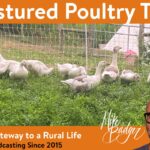Pasturewashing is the latest marketing craze where traditional poultry integrators want to capitalize on the success of pasture-raised chicken and eggs without following the principles of production. It’s a form of greenwashing. Greenwashing describes a marketing tactic that positions an ordinary product as green or environmentally friendly in order to appeal to a buyer’s emotion in exchange for a price premium or cost savings; think spin.
For more than 30 years, farmers have been perfecting the pasture raised poultry model since Joel Salatin started sharing his ideas with the world (around 1990).
Creating a pasture-raised divide where none existed
Only recently have companies started to actively redefine what pasture-raised chicken and pasture-raised eggs mean. The divide is being perpetrated through third-party certifications, such as certified organic, GAP, certified humane, and so on. And here-in lies the pasturewashing problem. The certifications and companies who want to cash in with a pasture-raised chicken/egg claim are doing so by removing two of the most important elements: outdoor production and regular flock movement.
The vertically integrated poultry companies want to benefit from economies of scale so that they produce a cheaper chicken or egg. But they want to make a label claim, and making a pasture-raised claim is a hot market.
In practice, this looks like a stationary barn with a few doors that open to an outside paddock. It may be true that the birds “have year around access,” but the reality is much different. The stationary barn is the first clue. When you actually see pictures of the pasture, you’ll notice tremendous pasture impact in the immediate area of the barn – it will be dirt and the pasture will be over-grazed. And dirt-lot poultry is not pasture-raised.
What you’ll often see in the marketing photos is a couple dozen chickens in the pasture and all the grass will be an even height. This is your signal that the chickens do not go outside because there’s no grazing impact.
With pasturewashed chicken and eggs, what you see is either pasture degradation (i.e., dirt) from over grazing or uniform growth with no impact from lack of pasture utilization. There is no in between.
The truth about poultry movement
As a consumer or a farmer, you must realize the movement in the pasture is the reason for the flavor, the bird health, the environmental health, animal welfare, and nutrient density. When you remove movement, you often limit the outdoor exposure of the flock. Removing deliberate flock movement through the pasture will compromise the final product in some way.
This video from American Pastured Poultry Producers Association provides a look at what makes pastured poultry different.
Greenwashing Poultry
When consumers shop for pasture-raised chicken and eggs, they are looking for something different. Are consumers really looking for a company to control the entire supply chain using contract growers with a weekly processing capacity of 700,000 birds, as a recent company suggests. That sounds like a small version of the larger poultry industry that consumers are opting-out of.
While the pastured poultry community is filled with farms who are vertically integrating parts of their operation and using a variety of chicken types, it’s a much more local or regional presence. Scale in pastured poultry may be a 1,000 birds or it may be a couple hundred thousand in a year. The diversity in approach creates a healthy, local economy that features direct-to-consumer relationships. These are relationships you don’t get at hundreds of thousands of chickens a week in a integrator-grower relationship, and that’s a missed opportunity for companies who are pasturewashing the market.
I’d love to hear what you think on this issue. Discuss on Facebook or leave a voicemail. If you have an opposing view of what pasture-raised chicken or eggs mean, then I invite you to come on the podcast to discuss the issue. I’ll give you the courtesy of providing your view point in exchange for a debate.
Resources
The following resources were mentioned in the episode:
- Fighting Farmer Podcast Episode 40: poultry gotta move
- Better Way Forward Video
- Access to pasture is not enough to make pasture-raised chicken
American Pastured Poultry Producers Association is producing a four-video series to brand and market pasture-raised poultry. They are asking pastured poultry producers to buy into the cooperative marketing program to fund the production. Help Share the Pastured Poultry Message – APPPA’s Video project.

